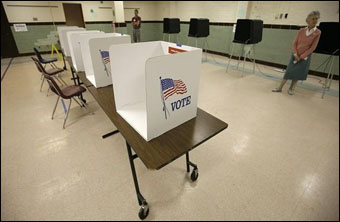OPINION
Voters mostly opted out, but were clear on economic issues
By JEFF JOHNSON
(Nov. 6, 2014) — A lot of Republicans won on Tuesday; both here and around the country. Contrary to the pronouncements of political operatives, there was not a repudiation of one party’s values and the crowning of another’s. The truth is the majority of those registered and eligible to vote, chose not to.
 I would suggest that they chose not to vote because they didn’t see a compelling enough difference between the two parties or a compelling enough difference between competing visions. The 2014 election cycle was not one characterized by a robust debate over different ideas and values. And as a result, who got elected was determined more by who didn’t vote than by which party did the better job of getting their partisans to vote.
I would suggest that they chose not to vote because they didn’t see a compelling enough difference between the two parties or a compelling enough difference between competing visions. The 2014 election cycle was not one characterized by a robust debate over different ideas and values. And as a result, who got elected was determined more by who didn’t vote than by which party did the better job of getting their partisans to vote.
Two things were striking about this election — low voter turnout and the passage of a number of economic fairness measures introduced in blue, red, and purple states.
While election results are not yet final in Washington state, as of noon on Nov. 5, far fewer than 50% of registered voters had exercised their democratic right. Very telling was the fact that only about 16% of registered youth, 25% of registered people of color, and 18% of registered single women under the age of 50 had voted by that time. While these percentages will rise over the next few days as more ballots are counted, the fact is the overwhelming majority of this portion of the rising American electorate chose not to vote.
But it would be wrong to deduce that the problem isn’t with candidates, parties, issues and values but that it is just a turnout issue. People don’t turn out to vote for reasons. They don’t turn out because they don’t see the issues important to their lives being discussed in a cogent and robust way. Interestingly enough, though, in states where simple economic fairness measures were on the ballot, they passed overwhelmingly.
Increasing the minimum wage was on the ballot in Arkansas, Alaska, Illinois, Nebraska, South Dakota, as well as Oakland and San Francisco, Calif. Each minimum wage measure passed overwhelmingly — the lowest vote total was in South Dakota where it passed by 55% of the vote.
Paid Sick Leave passed in the state of Massachusetts, Oakland, California, Trenton, New Jersey, and Montclair, N.J. A Pay Equity measure passed in Oregon and a measure to lower mass incarceration passed in California.
The city of Anchorage defeated a so-called “Right to Work” measure and Missouri defeated an amendment to restrict collective bargaining rights for teachers.
And transportation and mass transit funding measures passed in Georgia, Maryland, Rhode Island and Wisconsin.
American voters get measures and candidates that run on economic fairness issues and measures that create needed infrastructure and jobs. This is not rocket science. This about a fundamental sense of justice and fair play that we share as a core American value as well as the fact that the majority of Americans have not recovered from the “Great Recession.”
All of this brings us to Washington and what happens during the 2015 legislative session. The election battles were hard fought and are now over. Those candidates that won should be congratulated, but also recognize they have responsibility to listen to the public, including the majority of registered voters who chose not to vote.
During the 2015 legislative session legislators will have the opportunity to hear and pass a set of measures — a “Shared Prosperity Agenda” — that would address economic fairness and job creation — issues such as minimum wage, paid safe and sick leave, remedies against wage theft, pay fairness and equity, etc. The public understands these issues, not as partisan issues but as measures that will improve their lives and our economy. I hope that red, blue and purple agree, just like the people of South Dakota, Arkansas and California agree.
 Jeff Johnson is President of the Washington State Labor Council, AFL-CIO, the largest labor organization in the Evergreen State, representing the interests of more than 500 local unions and 400,000 rank-and-file union members.
Jeff Johnson is President of the Washington State Labor Council, AFL-CIO, the largest labor organization in the Evergreen State, representing the interests of more than 500 local unions and 400,000 rank-and-file union members.





